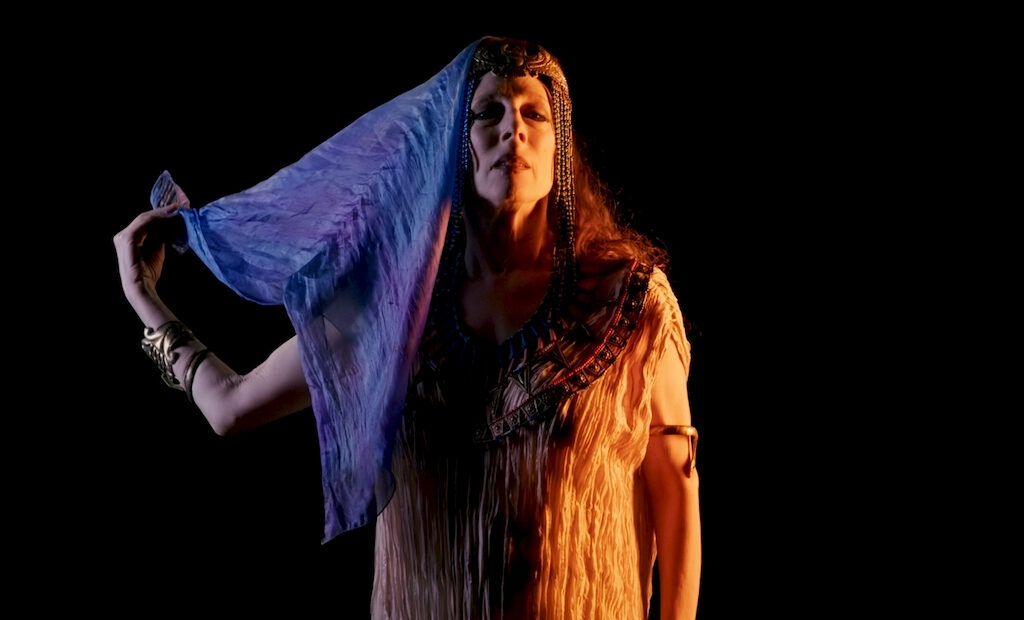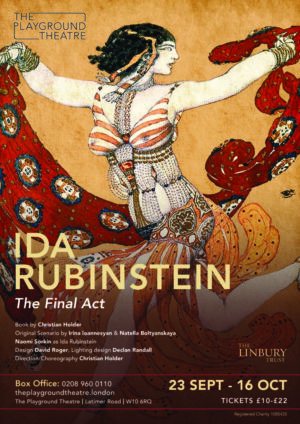Ida Rubinstein: The Final Act at the Playground Theatre

“I was not a woman of the era. I was the era.”
A golden Egyptian statue with a lantern in her hand, an ornate single bed, a piano and bed sheets bathed in soft blue and purple tones set the stage for tonight’s performance. A veiled figure is projected onto the sheets, slowly removing the layers to reveal her red, faded hair, as a figure in a gaudy, yet strangely ethereal shawl stands behind her projected image, waiting to be revealed.
Ida Rubinstein: The Final Act tells the story of a wealthy Russian dancer, art patron and muse for several legendary musicians and artists. She lived a noteworthy life: born into extravagant money, she was determined to be a performer and pushed on the edge of convention, even stripping nude during The Dance of the Seven Veils in her first official stage performance in Oscar Wilde’s Salome. This was a move that prompted some mortified members of her family to commit her to an asylum, which is shown in an eerie, echoey flashback during tonight’s show. After her release, Ida returned to the stage and ended up founding her own company, forming close bonds with musicians, poets and artists, and immortalised by their work.
This play tells a fictionalised account of an interview Ida (Naomi Sorkin) does with journalist Edward Clement (Max Wilson) towards the end of her life. Through this exchange, several flashback sequences and voiceovers, the reclusive former celebrity recounts her story.
Rubinstein’s personal life was as colourful as her stage persona. Openly bisexual in the early 20th century, she engaged in several relationships with a range of prominent names, including artist Romaine Brooks (Kathryn Worth), writer and soldier Gabriele D’Annunzio (Marco Gambino) and pianist Joseph Maurice Ravel (Darren Berry). These interactions play out in the production through asides, dance sequences and dialogue. The dance sections feel a little chintzy and overdone at times, but they do a good job of illustrating the changing dynamics in these poly relationships – particularly in a sequence where Brooks, d’Annuzio and Rubenstein snatch and pass a lily to one another, switching between partners and using their faces to signal excitement and jealousy in equal measure.This is Ida’s story, but the others get to have their say on their relationships: “It was overwhelming. I can’t be loved like this”.
Naomi Sorkin does a fabulous job of portraying the eccentric, charismatic and yet fragile diva who lives on champagne and has a huge, yet fragile ego. She looks like Rubinstein, but what is most striking is how well she captures her spirit. Sorkin and Wilson have great chemistry, and Wilson’s performance really brings through the admiration and concern that he feels for his interviewee. Kathyrn Worth (also as Soretto) doesn’t say much, but her little eye-rolls and obvious annoyance speak volumes.
The set design is perfect and really brings out the Belle Epoque style. It aptly reflects the central character’s personality: elegant, yet delicate, over-the-top and yet carefully crafted, and one can see that every detail has been carefully thought over. Projections of video clips, imagery and artwork add a historical element to the show, reminding viewers that these characters were very much real people.
It’s surprising that many won’t have heard much about Ida Rubinstein or her associates. Types of art, music and performance she favoured may have gone out of style years ago, but her story of determination, passion and, finally, loneliness at being one of the last ones standing from a forgotten era is one that deserves to be told and remembered.
Sophia Moss
Photo: Matthew Ferguson (FG Studios)
Ida Rubinstein: The Final Act is at the Playground Theatre from 23rd September until 16th October 2021. For further information or to book visit the theatre’s website here.


























Facebook
Twitter
Instagram
YouTube
RSS